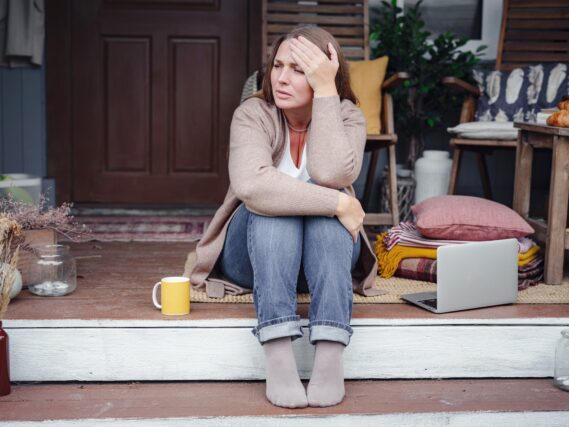Loneliness can be a sneaky beast.

It doesn’t always look like someone sitting alone in a dark room. Sometimes, it’s hidden behind smiles, social media posts, and busy schedules. We all have moments of feeling alone, but for some, it’s a more persistent feeling that seeps into their daily lives. So, how can you tell if someone might be struggling with loneliness?
1. They frequently cancel plans at the last minute.
 Source: Unsplash
Source: Unsplash Maybe they’re always “too tired” or “busy” to hang out, but the truth is they might be afraid of social interaction. The thought of putting themselves out there and facing the potential for rejection or awkwardness can be overwhelming. Cancelling plans becomes a way to avoid those uncomfortable feelings.
2. Their social media doesn’t match their reality.
 Source: Unsplash
Source: Unsplash Their Instagram feed might be full of smiling selfies and #bestlife posts, but behind the scenes, they could be struggling with deep loneliness. Social media can create a facade of happiness, masking the underlying feelings of isolation and disconnection.
3. They overshare personal details with acquaintances.

They may share super personal details about their life to people they barely know, like the barista at their coffee shop or the cashier at the grocery store. This could be a sign that they’re craving connection and seeking validation from anyone who will listen.
4. They always seem to be “busy.”
 Source: Unsplash
Source: Unsplash Maybe they fill their schedule with work, hobbies, or even mindless activities like scrolling through social media just to avoid being alone with their thoughts. While staying busy can be a good thing, it can also be a way to mask feelings of loneliness and avoid facing the underlying issues.
5. They’re overly critical of themselves and other people.
 Source: Unsplash
Source: Unsplash Loneliness can breed negativity and self-doubt. They may constantly put themselves down, focus on their flaws, and criticise people to make themselves feel better. This negative self-talk can be a symptom of deeper emotional pain and isolation.
6. They have trouble maintaining close relationships.
 Source: Unsplash
Source: Unsplash It’s possible that they have a lot of acquaintances but few close friends. Maybe they struggle to connect with people on a deeper level or fear getting too close. This could be due to past hurts or a fear of vulnerability. It’s also possible that they have major trust issues, which makes it hard to form lasting bonds.
7. They’re constantly in need of validation and approval.
 Source: Unsplash
Source: Unsplash They may seek constant reassurance from anyone who will give it to them, fishing for compliments or approval. This need for external validation can stem from a lack of self-worth and a feeling of not being good enough. They might also be overly sensitive to criticism and take it personally, even if it’s constructive.
8. They withdraw from social situations.
 Source: Unsplash
Source: Unsplash They often avoid social gatherings, prefer to eat alone, or always have an excuse for why they can’t hang out. This withdrawal can be a defence mechanism to protect themselves from potential rejection or hurt. It can also be a sign of social anxiety or depression.
9. They find it hard to express their emotions.
 Source: Unsplash
Source: Unsplash It’s possible that they struggle to articulate how they feel or avoid talking about their emotions altogether. This could be due to past experiences where their feelings were dismissed or invalidated. They might also fear being judged or considered weak for expressing vulnerability.
10. They’re always the one initiating conversations or plans.
 Source: Unsplash
Source: Unsplash If you notice that you’re always the one reaching out to them or making plans, it could be a sign they’re struggling with loneliness. They may be afraid of rejection or simply not have the energy to initiate social interactions. This can make them feel isolated and disconnected from everyone around them.
11. They spend a lot of time alone.
 Source: Unsplash
Source: Unsplash While enjoying alone time is perfectly healthy, excessive isolation can be a sign of loneliness. If they consistently decline invitations, prefer to stay home, or seem to have no social life, it could be a red flag. They could be feeling disconnected from people or struggling to find people they connect with.
12. They struggle to sleep or experience changes in appetite.

Loneliness can take a toll on physical health, the British Medical Association reveals, leading to sleep disturbances like insomnia or oversleeping. They may also experience changes in appetite, either eating too much or too little. These physical symptoms can be a manifestation of the emotional distress caused by loneliness.
13. They express feelings of hopelessness or worthlessness.

Loneliness can trigger negative thoughts and feelings, leading to a sense of hopelessness or worthlessness. They might make comments like, “Nobody cares about me,” or “I’m not good enough.” These statements can be a cry for help and a sign that they’re struggling with their mental health.
14. They turn to unhealthy coping mechanisms.

In an attempt to numb their loneliness, they might turn to unhealthy coping mechanisms like excessive drinking, drug use, or overeating. These behaviours are not a solution to the problem and can actually worsen it in the long run. It’s important to encourage them to seek healthier ways to cope, such as therapy, exercise, or connecting with supportive friends and family.




